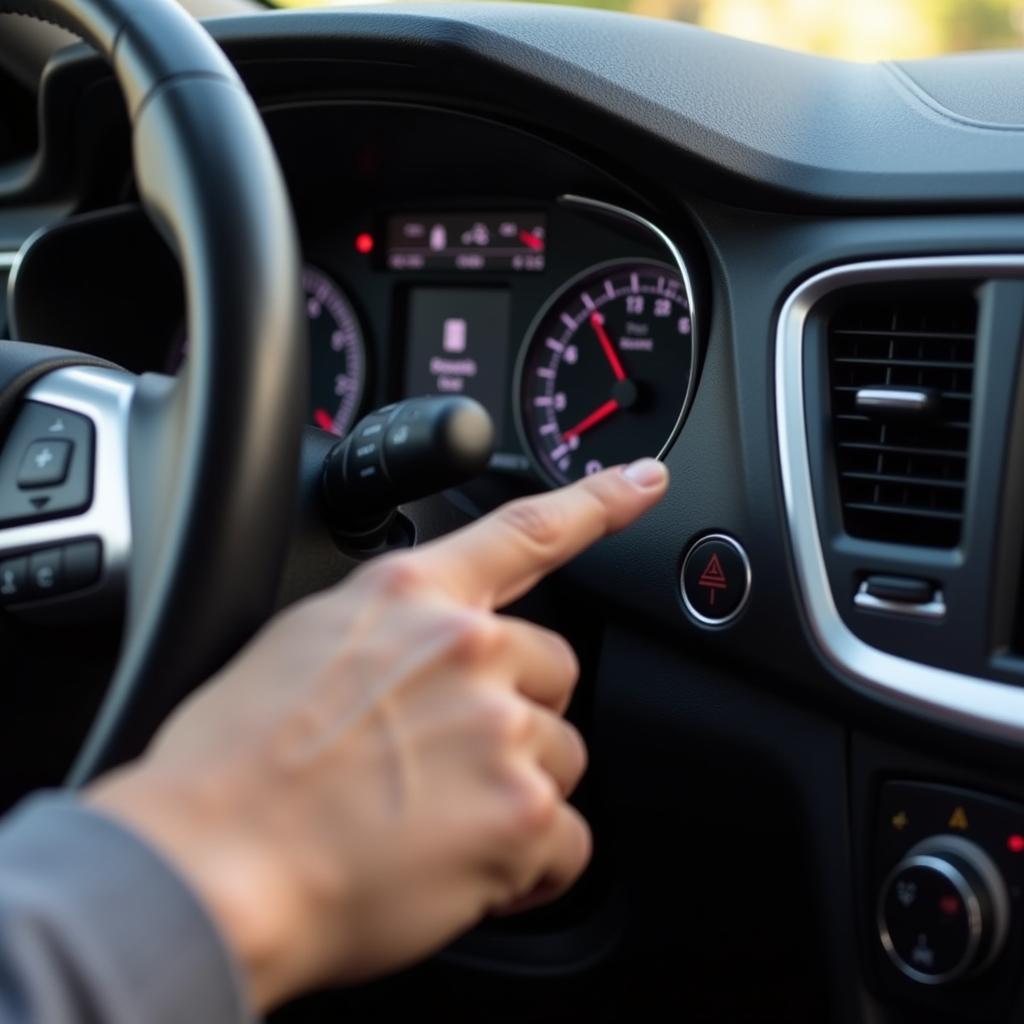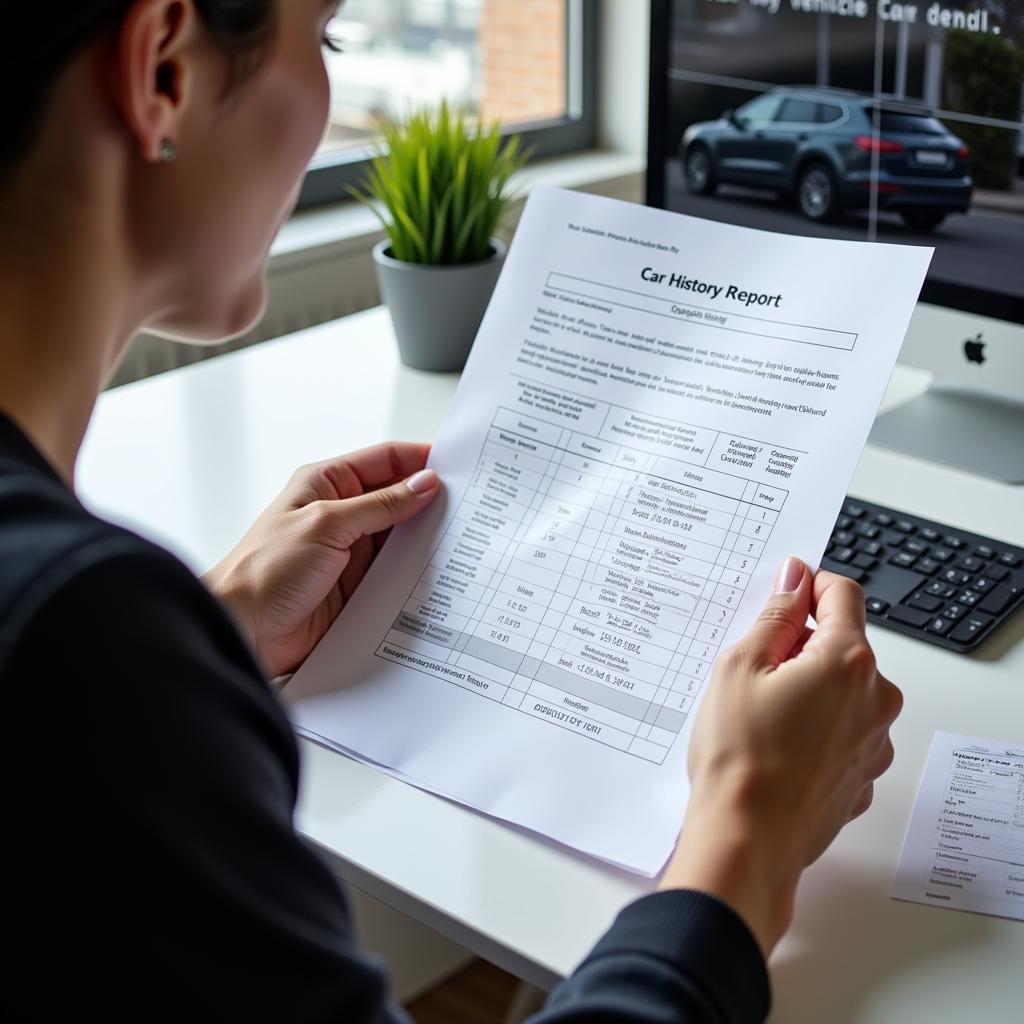Checking car details is a crucial step before purchasing any used vehicle. Whether you’re buying from a dealership or a private seller, accessing comprehensive vehicle information empowers you to make informed decisions and avoid potential pitfalls. This guide provides everything you need to know about checking car details, from understanding vehicle history reports to inspecting the car’s physical condition.
Decoding the Importance of Checking Car Details
Before handing over your hard-earned cash, “check car details” should be your mantra. A thorough check can reveal hidden problems, such as previous accidents, title issues, outstanding finance, or even mileage discrepancies. This knowledge not only protects you from buying a lemon but also gives you leverage during price negotiations.
How to Check Car Details: A Step-by-Step Guide
Checking a car’s details involves several key steps:
- Obtain the Vehicle Identification Number (VIN): The VIN is a 17-character code unique to each vehicle. It’s like the car’s fingerprint. You can usually find it on the dashboard, driver’s side doorjamb, or vehicle title.
- Run a Vehicle History Report: Websites like Carfax and AutoCheck provide detailed reports based on the VIN. These reports reveal crucial information, including accident history, title status, mileage records, and service history.
- Inspect the Car’s Physical Condition: A visual inspection is essential. Look for signs of previous repairs, rust, mismatched paint, or any other irregularities.
- Mechanical Inspection: Take the car to a trusted mechanic for a pre-purchase inspection. They can identify potential mechanical problems that might not be apparent during a visual inspection.
Understanding Vehicle History Reports: What to Look For
Vehicle history reports are a goldmine of information. Pay close attention to the following:
- Accident History: Look for details about the severity of any accidents, including the type of damage and the parts affected.
- Title Status: Check for any title brands, such as “salvage,” “rebuilt,” or “flood damaged.” These brands can significantly impact the car’s value and insurability.
- Mileage Records: Verify that the mileage on the odometer matches the reported mileage in the history report. Discrepancies could indicate odometer fraud.
- Service History: Regular maintenance is a good sign. A well-documented service history can indicate that the previous owner took good care of the vehicle.
 Checking VIN on Car Dashboard
Checking VIN on Car Dashboard
Beyond the Reports: A Hands-On Approach to Check Car Details
While vehicle history reports provide valuable insights, a physical inspection is equally important. Here are some key areas to focus on:
- Exterior: Check for dents, scratches, rust, and mismatched paint. Inspect the panel gaps for consistency, which can indicate previous bodywork.
- Interior: Examine the upholstery for wear and tear. Check the functionality of all the controls, including the air conditioning, radio, and power windows.
- Engine Compartment: Look for leaks, corrosion, and worn belts or hoses. Check the fluids, such as oil and coolant, for proper levels and condition.
- Undercarriage: Inspect for signs of rust, damage, or leaks.
Why Checking Car Details is Worth the Effort
“Checking car details might seem like a hassle, but it’s a small price to pay for peace of mind,” says John Smith, Senior Automotive Technician at CarDetailingUK. “It’s always better to be safe than sorry, especially when you’re making a significant investment.”
Check Car Details: Protecting Your Investment
Checking car details is not just about avoiding problems; it’s about making a smart purchase. By gathering as much information as possible, you can negotiate a fair price and ensure that you’re getting a vehicle that meets your needs and expectations.
 Customer Reviewing Vehicle History Report
Customer Reviewing Vehicle History Report
Conclusion
Checking car details is an essential step in the car buying process. By utilizing online resources, conducting a thorough physical inspection, and seeking professional advice when needed, you can confidently make informed decisions and protect your investment. Remember, checking car details is your first line of defense against buying a problematic vehicle.
FAQ
- What is a VIN? A VIN, or Vehicle Identification Number, is a 17-character code that uniquely identifies a specific vehicle.
- Where can I find the VIN? The VIN can usually be found on the dashboard, driver’s side doorjamb, or vehicle title.
- What does a vehicle history report tell me? A vehicle history report provides information about a car’s past, including accident history, title status, mileage records, and service history.
- Why is it important to check car details? Checking car details helps you avoid buying a car with hidden problems, such as previous accidents, title issues, or mileage discrepancies.
- How much does a vehicle history report cost? The cost of a vehicle history report varies depending on the provider, but they typically range from $20 to $40.
- What should I look for during a physical inspection? Look for signs of previous repairs, rust, mismatched paint, and any other irregularities.
- Should I take the car to a mechanic for a pre-purchase inspection? Yes, a pre-purchase inspection by a trusted mechanic is highly recommended.
Related Articles on CarDetailingUK
- The Ultimate Guide to Car Detailing
- How to Protect Your Car’s Paint
- Choosing the Right Car Wax for Your Vehicle
Need assistance checking car details? Contact us via WhatsApp: +1(641)206-8880, Email: [email protected]. Our 24/7 customer support team is ready to help.

Leave a Reply